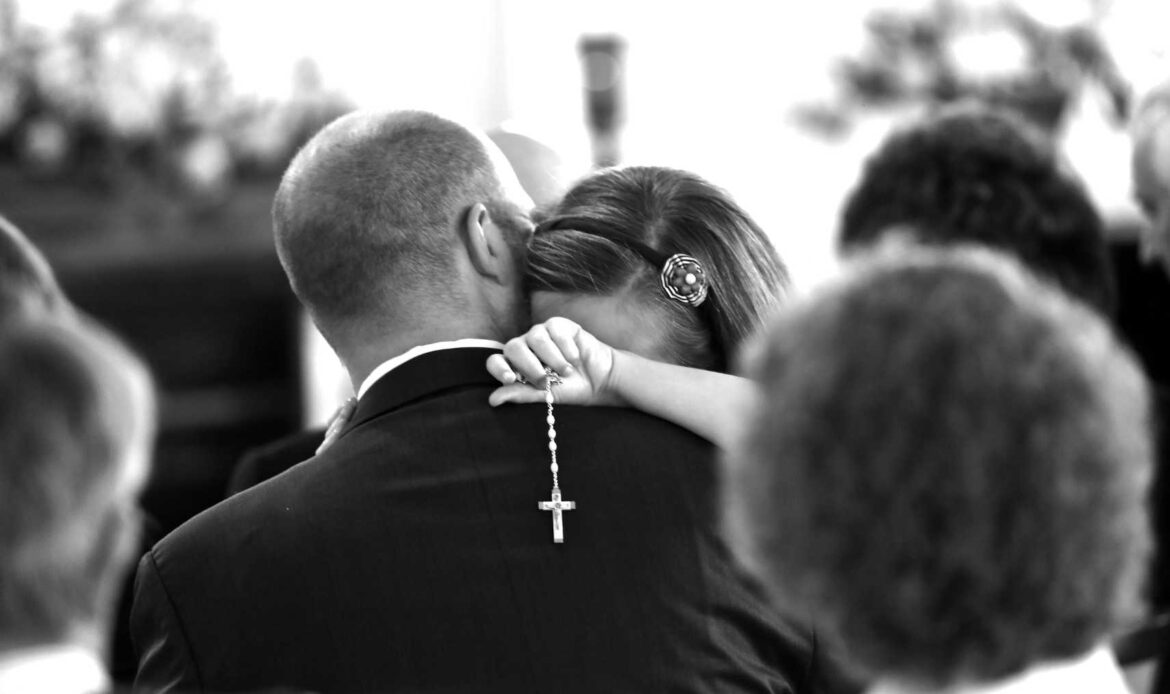There’s no roadmap for this.
When someone you care about is wrecked by grief, especially the kind that came out of nowhere, that knocked the air out of their lungs and left them reeling, you’re going to want to say something that helps.
And chances are, nothing will feel like enough.
Here’s the truth most people won’t say out loud: You can’t fix this. Not with the right quote, not with a casserole, not with a softly worded text. So if you’re frozen, unsure of what to say, scared you’ll mess it up—let’s start with the most basic, human offerings. Not the “right” words. Just the real ones.
Start with the basics
These are the things that might feel too simple to say. But when someone’s world has just been split wide open, simplicity is a gift. You don’t need the most poetic words to get to them, you just need to be there.
“I’m so sorry.”
It’s not groundbreaking, but it’s true. And right now, truth matters more than eloquence. Don’t dress it up and definitely do not follow it with a silver lining. Just let the sentence land.
“I can’t believe this.”
Shock is a language the grieving person is fluent in. This validates that what happened is incomprehensible, unfair, wrong. Sometimes naming that shared disbelief is more comforting than a hundred “stay strong”s.

“I don’t have the right words, but I’m here.”
Because there are no right words. But showing up anyway? That’s rare. That’s what they’ll remember, and they’ll also remember that you didn’t run away when things got heavy.
If you knew the person who died
There’s something sacred about witnessing someone’s life, even just pieces of it. If you knew the person who passed (no matter how well) your words carry weight. Not because you’re supposed to deliver a eulogy in a text message, but because you can remind the grieving person: They mattered. They’re still remembered. They’re still loved.
“They were such a good person.”
If this is true, say it. Grief often comes with this haunting fear that the world will move on too quickly, that people will forget. Saying it out loud helps anchor the memory in place.
“I’ll never forget when…”
We fear being forgotten when we pass, and it’s our stories that follow our loved ones long after we’re gone from this world. And now’s the time for stories, even if they’re small. That one time they made you laugh so hard you cried. The way they always held the door open. The terrible puns, the warm hugs, the fierce way they loved. A moment that’s stuck with you. Share it. That memory is a thread that ties them back into the world, even just for a second.
“I miss them too.”
There’s something oddly soothing about knowing someone else is carrying the weight too. You don’t need to compare pain… just letting them know they’re not grieving alone is enough.
If you didn’t know them
You don’t have to know the person who died to hold space for the person who’s grieving. When someone is deep in the hollowed-out ache of loss, what they usually need most isn’t shared memories, it’s shared humanity. They need to know they’re seen, that their pain doesn’t make them a burden, and that even strangers can show up with softness.

“I know how much you loved them.”
Sometimes all you can do is reflect the love that was lost. This sentence matters more than it seems. It honors the grief by honoring the depth of the connection.
“I’m thinking about you and your family.”
It might feel simple, but in a moment where everything feels out of control, this says, “You’re not alone.” It reminds them that even in the chaos, someone is holding them in their thoughts.
“If there’s anything I can do, let me know.”
Yes, this one gets a bad rap for being vague. But when it’s said with sincerity, and followed up with presence, it’s not empty. If you don’t know what to do, start here. And then actually check in later, even just to say you’re still thinking of them.
If you’re close to the grieving person
When someone you love is grieving, it can feel like you’re holding your breath around them, afraid to say the wrong thing, unsure if you’re helping at all. But here’s the thing: your consistent, quiet presence will mean more than the perfect words ever could. Especially when everyone else starts drifting away after the funeral, you get to stay.
“I’m coming over with food.”
Don’t ask what they need, just do something small and tangible. You can show up with a warm meal, a pot of coffee, their favourite snacks, or even a loaf of bread. When you’re grieving, even deciding what to eat feels like an impossible math problem. This sentence says, “I’ve got one less thing for you to think about.”
“I’ll text to check in… no pressure to respond.”
Let them know you’ll keep reaching out without expecting anything in return. You’re not waiting for them to “get better.” You’re just there. And maybe they won’t respond, but they’ll know that they can rely on you, especially when the hard days hit.
“I’ve got time if you want to talk or sit in silence.”
This is the holy grail of grief support: just offering yourself as a soft landing. If they want to talk, you listen. If they want to cry, you hand them tissues. If they want to sit in silence and stare out the window, you sit too.

If you’re not sure what to say
There is no sentence that can undo the grief and no words can bring someone back. So let’s stop trying to be profound and just be present.
“This is awful and I’m so so sorry.”
Grief is already isolating, don’t make it lonelier by dancing around the truth. Clumsily acknowledging their pain is better than poetically dancing around the pain.
“I wish I had better words.”
This one’s honest. And it shows you’re not here to minimize or patch things up. You’re here to witness the pain, which is so much more meaningful than forcing silver linings.
“Just wanted you to know I’m thinking about you.”
This one is just a small reminder that they haven’t been forgotten in a world that seems to have moved on. You don’t have to write a novel, just show up in whatever small way you can.
Parting notes…
If you’re reading this because someone you love is grieving—thank you. Seriously. Showing up, even imperfectly, matters more than you know.
The truth is, when someone dies unexpectedly, it leaves a tangled, aching, silent kind of mess that most people will quietly tiptoe around. But you’re here trying to speak into that silence, and that’s something.
Keep texting even when they don’t reply. Keep inviting them even if they say no. Keep saying their loved one’s name, even if it makes everyone tear up. That’s not hurting them, it’s reminding them their grief still matters. That they still matter.
And when the grief is too heavy for both of you to hold? That’s when you bring in the pros.
The Mentally STRONG Intensive is a space built for exactly this kind of pain. It’s where people can learn how to carry their grief without collapsing under it. It’s for the ones who don’t want to just survive it, they want to make sense of it, honor it, and still find a way forward.So if you’re sitting there thinking, I don’t know what else to do, and if you think they are ready for this step in their journey, click here to learn more..

